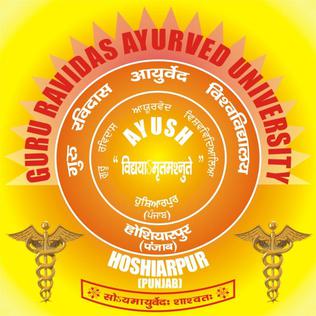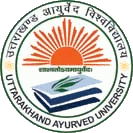
Dhanvantari is the Hindu god of medicine and an avatar of Lord Vishnu. He was the king of Varanasi. He is mentioned in the Puranas as the god of Ayurveda. He, during the Samudramanthan arose from the Ocean of Milk with the nectar of immortality. It is a common practice in Hinduism for worshipers to pray to Dhanvantari seeking his blessings for sound health for themselves and/or others, especially on Dhanteras or Dhanwantari Trayodashi.

Jamnagar is a city located on the western coast of India in the state of Gujarat in the Saurashtra region. It is the administrative headquarters of the Jamnagar district. Jamnagar is the largest city on the west coast of India and is the fifth largest city of Gujarat, after Ahmedabad, Surat, Vadodara, and Rajkot.

Maharashtra University of Health Sciences (MUHS) is a higher education institution in Nashik, Maharashtra, India.
The Ministry of Ayush, a ministry of the Government of India, is responsible for developing education, research and propagation of indigenous and alternative medicine systems in India. Ayush is a name devised from the names of the alternative healthcare systems covered by the ministry: Ayurveda, Yoga, Naturopathy, Unani, Siddha, and Homoeopathy.
Dr. Sarvepalli Radhakrishnan Rajasthan Ayurved University, formerly Rajasthan Ayurved University, is Ayurved university in the state Rajasthan. The university situated in Jodhpur was founded on 24 May 2003.
Sri Dharmasthala Manjunatheshwara College of Ayurveda and Hospital (SDMCAH), Hassan, was established in the year 1992 by Veerendra Heggade as a part of SDM Educational Society. The college has Affiliation/Recognition from RGUHS, Bangalore and Central Council of Indian Medicine, New Delhi.

Patanjali Yogpeeth in Haridwar, Uttarakhand, is one of the largest yoga institutes in India, and possibly in the whole world. Named after the Rishi Patanjali, the institute is Ramdev's flagship project. Its purpose is to practice, research and develop yoga and ayurveda. It is also the home of the University of Patanjali. Balkrishna is the General Secretary of Patanjali Yogpeeth. Ramdev is the Vice-Chancellor of the Patanjali Yogapeeth.

The Kaivalyadhama Health and Yoga Research Center, founded by Swami Kuvalayananda in 1924, is a spiritual, therapeutic, and research center with a specific aim to coordinate ancient yogic arts and tradition with modern science; he founded the journal Yoga Mimamsa at the same time. Kaivalyadhama is located in Lonavla, Maharashtra, India, with smaller branches elsewhere in India, France, and the United States.

Guru Ravidas Ayurved University is a public university for Ayurveda, Yoga & Naturopathy, Unani, Siddha and Homeopathy located in Hoshiarpur, Punjab, India.
Shree Somnath Sanskrit University (SSSU) is a public university located in Gujarat, India. It was created by the Gujarat State government through the Shree Somnath Sanskrit University Act in 2005 for the research and teaching of Sanskrit literature, with objectives to preserve India’s cultural and linguistic heritage. The main campus in Veraval is home to seven departments, or faculties, which, together with 110 affiliated colleges, research institutes, and centers across Gujarat, award nine different degrees, including B.A., M.A., and PhD, in a variety of fields. Shree Somnath Sanskrit University publishes a quarterly research publication, Somajyoti, and organizes regular workshops and conferences to promote discourse and research in Sanskrit language and culture.

Patanjali Ayurved,, is an Indian multinational conglomerate holding company, based in Haridwar, India. It was founded by Ramdev and Balkrishna in 2006. Its office is in Delhi, with manufacturing units and headquarters in the industrial area of Haridwar. The company manufactures cosmetics, ayurvedic medicine, Personal care and food products. The CEO of the company, with a 94-percent share hold, is Balkrishna. Ramdev represents the company and makes strategic decisions.
Rajesh Kotecha is an Indian Ayurveda physician who received a Padmashri Award for Medicine in 2015. He was appointed Secretary of the Ministry of AYUSH in the Government of India in July 2017, and is the former Vice Chancellor of Gujarat Ayurveda University, Jamnagar, a post he held from 2013 to 2016.
Paneenazhikath Narayana Vasudeva Kurup was an Indian Ayurvedic practitioner, researcher, writer and the founder director of the Central Council for Research in Homoeopathy (CCRIMH). He is a former vice chancellor of the Gujarat Ayurved University, Jamnagar and a former advisor of the Indian Systems of Medicine and Homoeopathy (ISM&H) of the Ministry of Health and Family Welfare. He has published several articles and a book, A Handbook on Indian Medicinal Plants, on the traditional Indian medicine system, The Government of India awarded him the fourth highest civilian honour of the Padma Shri, in 2005, for his contributions to Indian medicine.
Ram Harsh Singh is an Indian practitioner of the Ayurveda system of alternative medicine and the founder vice chancellor of Dr. Sarvepalli Radhakrishnan Rajasthan Ayurved University. An Emeritus Professor of Banaras Hindu University and a National Professor of the Ministry of AYUSH of the Government of India, he was conferred with the fourth highest civilian honour of Padma Shri, in 2016.

The All India Institute of Ayurveda, Delhi is a public Ayurveda medicine and research institution located in New Delhi, India.

Uttarakhand Ayurved University is a state university located at Dehradun, Uttarakhand, India. It was established in 2009 by the Government of Uttarakhand through the Uttarakhand Ayurved University Act, 2009 and focuses on teaching and research of Ayurveda, as well as other areas of AYUSH. Sunil Kumar Joshi was appointed vice chancellor in 2020.

Balkrishna is an Indian billionaire businessman and chairman of the consumer goods company Patanjali Ayurved. He was reported by Forbes to have a net worth of US$2.3 billion as of May 2021. According to Ashish Kumar of Arya Samaj, Balkrishna has successfully established and managed a global business without a formal education.
Gurdip Singh is a professor from Gwalior, India. He is a senior professor of Ayurveda and the Director of Post Graduate Studies at the SDM College of Ayurveda and Hospital in Hassan, Karnataka. He is considered an authority on the Ayurveda work Charaka Samhita. Singh was a dean of Institute for Post Graduate Teaching and Research in Ayurveda at Gujarat Ayurved University at Jamnagar, Gujarat.

Bhaskar Vishwanath Gokhale, also known as Vaidya Bhaskar Vishwanath Gokhale, and popularly called Mama Gokhaleji, was an Indian Ayurveda practitioner, Ayurvedic teacher, freedom fighter, and philosopher.
Charaka shapath is a certain passage of text in Charaka Samhita, a Sanskrit text on Ayurveda believed to have been composed between 100 BCE and 200 CE. The passage referred to as Charaka Shapath is written in the form a set of instructions by a teacher to prospective students of the science of medicine. According to Charaka Samhita, the unconditional agreement to abide by these instructions is a necessary precondition to be eligible to be taught in the science of medicine. The passage gives explicit instructions on the necessity of practicing asceticism during student life, student-teacher relationship, the importance of committing oneself fully and completely for the well-being of the patient, whom to treat, how to behave with women, and several other related issues. The passage appears as paragraphs 13–14 in Chapter 8 of the Vimanasthana in Charaka Samhita.











